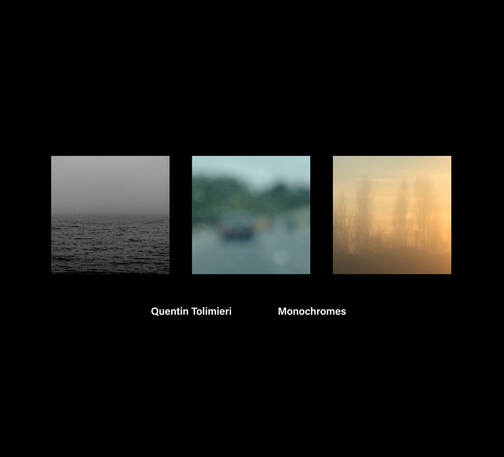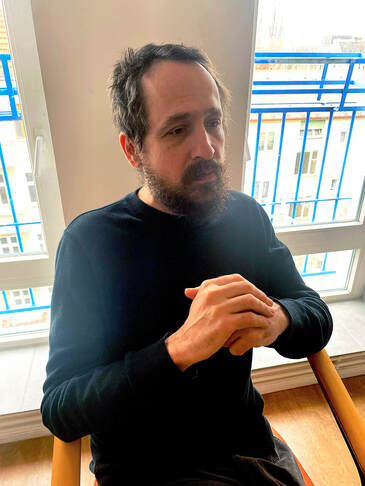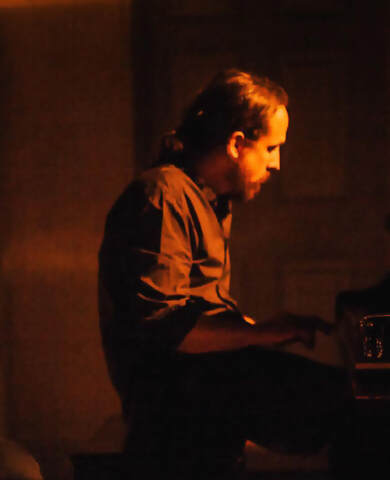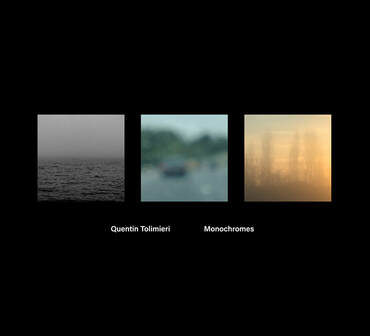Q&A with Quentin Tolimieri
about Monochromes
|
"I started thinking, if I could eliminate as many of these structures as possible, I could start hearing these sounds more clearly. Almost as if, if I could remove the language, the syntax, the grammar, etc.,
I could hear the actual voice (of the piano).” — Quentin Tolimieri |
|
Yuko Zama (YZ): I read that you are from New York and lived there for a long time. When did you move to Berlin?
Quentin Tolimieri (QT): I lived in NYC for about 15 years. I moved to Berlin in the Fall of 2018. I guess once getting set up here I had about a year or so before Corona, although we were able to mostly continue a good amount of artistic activity here, despite quarantines and lockdowns. YZ: I heard that you used to play jazz and improvisation. When was that? And are you still playing jazz and improvisation, or did you start to focus more on composing contemporary classical pieces (and/or piano pieces) at some point? QT: I used to play Jazz and Improvised music quite a bit, although I have always been a bit halfway between the improvised music and composed music worlds and never felt quite at home in either. For most of the time I was in NYC I was really just writing music, mostly electronic music, that was probably closest to something like Conlon Nancarrow. I really didn’t play the piano seriously for about 10 years or so. I came back to the piano around 2011 or 2012. At first, actually, I started playing for work, I started accompanying a lot of dance classes, which then got me back into thinking about the instrument. When I first started really playing my own music again around 2014, I started off trying to play improvised music, probably with a lot of Cecil Taylor influence, although I don’t think I was doing that great of a job at it. (I’m a little embarrassed about some of the playing I did early on when I first started again.) But for a variety of reasons, I became less interested in improvisation as a genre, although as a technique I find it quite useful. I still do play the occasional free jazz and/or improvised music session with people here in Berlin, but I find it more interesting to work on developing a group sound and approach with a band. A project I have had going most of last year, for example, is an organ trio (organ, guitar, drums) that is very experimental, but also oftentimes very groove oriented as well, sort of a mix between Derek Bailey and Bo Diddley or something. But we work quite a bit on coming up with a group sound/ approach. |
|
YZ: In your bio, I read that you studied with Joe Maneri. Was it when you lived in NYC? What did you learn from him specifically? (I was a huge fan of Joe Maneri when I spent half of the years in NYC in 1999-2002.)
QT: I loved Joe! He was such a great musician. I actually studied with him in Boston, before going to CalArts. I guess he was my first real teacher. I was mostly attracted to him because of his improvising, but we really ended up working on composition. His composition teaching was actually extremely rigorous, and maybe by today’s standards a little old fashioned, coming out of the Schoenberg school of teaching. I remember we did many, many counterpoint exercises, which I think maybe instills a certain kind of thinking about composing, how to think vertically and horizontally at the same time, how to approach solving problems not only at the point that they arise, but also on a more global level, if that makes any sense. I am not sure how much this work with Joe is evident in these particular pieces, but definitely it plays a role in some of my earlier music. YZ: Do you think jazz and improvisation influenced how you create (and perform) music in your current activities? If so, how? QT: I definitely do think improvised music influenced these pieces. For one, there is a lot of improvising taking place in many of them, but it’s not Improvised Music per se, and it doesn’t really have the aesthetic interests that improvised music has. I mean, in something like Monochrome 2, the specific notes I’m playing at any given time aren’t written down, but the overall structure is so specific that no matter how I play it in any given performance, it will sound largely the same. But also, I think, one of the processes that took place in me developing these pieces is the following: As a pianist, I was always quite jealous of other instrumentalists in improvised music with their ability to seamlessly employ extended techniques, alternate tunings, noise, and things like this. (Of course, one can prepare the piano, or work inside the instrument, but somehow those always felt like a separate, distinct instrument to me.) It always felt to me that the piano was a bit limited by a kind of music history embedded in its construction: equal temperament, a particular kind of tone quality, etc., even the way the keys are laid out is not from any kind of acoustic necessity, but is, rather, a representation of European harmony. However, I began to realize that the piano is actually filled with all sorts of sounds, sounds that we don’t really hear or focus on because of all of the structural/linguistic things going on in music, for example a particular melody, a particular harmonic movement, a particular rhythm, a particular formal change. I started thinking, if I could eliminate as many of these structures as possible, I could start hearing these sounds more clearly. Almost as if, if I could remove the language, the syntax, the grammar, etc., I could hear the actual voice. I don’t know if that makes any sense, but that was one of the things I was thinking about with these pieces, especially pieces like Monochrome 8 and 12, for example. Quentin Tolimieri - Monochromes 12, 7, 10 (excerpts)
YZ: You studied with Michael Pisaro at CalArts in the early 2000s. What do you think was the most valuable thing that you have learned from him?
QT: With Michael, I think the most important thing for me was that I hadn’t really been exposed to experimental music before meeting him. Up to that point, in the composition world I had been interested in music like Berio, Ligeti, things like that. Before I went to CalArts I lived in Boston, which in those years could be fairly conservative musically. I briefly went to The New England Conservatory, and I am not sure I met anyone there who took, say, John Cage seriously (I’m sure there were people who did, but also plenty who thought his music was a joke, he was a charlatan, etc.) So, meeting someone like Michael who completely took this kind of music seriously, not just as theory but also as music was fairly eye opening for me. More than that, though (and I wouldn’t want to put any words in Michael’s mouth) but I think studying with him was when I started to realize that a piece of music has a kind of metaphoric life along with a musical one. That even the way a piece is constructed conveys a whole range of meanings and that a composer can be conscious of this. Or that, I suppose, music can be a conceptual art form. Actually, as I have gotten older I’ve started to think that the more interesting issue is that there is no way music cannot be a conceptual art form. Maybe a bit of these current pieces involves my trying to sidestep this inherent conceptual-ness of music. YZ: Who was (were) the biggest influence on you to be inspired to become a composer and pianist? You can mention more than one artist, from any genre, jazz, improv, classical, experimental, etc. QT: That would be a lot of names. Definitely my teachers, also including Michael Finnissy who is a beautiful composer, for piano in particular, and maybe in the US is a bit misrepresented as a New Complexity composer when his work is a lot more unique and diverse than that. I should say, with these pieces in particular, I was influenced greatly by my working with dance for many years. Especially accompanying classes of Martha Graham and Merce Cunningham technique. The way music can function in these classes (also in performance but particularly in class) is very specific. It needs to do very, very little to fulfill its function, it can oftentimes almost disappear, and in fact most musicians usually play way too much material. It was during these classes that I started to realize how little a piece of music had to do, and how it could exist as just a piece of a larger environment, the space, the architecture, the weather outside the windows, etc. But specifically for piano, I’d say definitely Monk would be at the top of the list, especially solo. Cecil Taylor, Feldman’s piano music, Nancarrow. It’s funny, I am not sure when I last listened to it, but a record that had a huge impact on me when I was young and I think still sort of informs my approach to the instrument is Michel Béroff playing the Messiaen Vingt Regards sur l'enfant-Jésus. The Gould recordings of Brahms and his second recording of Goldberg too. A lot of Professor Longhair as well. Outside of piano I love Billie Holliday, Derek Bailey, a lot of different types of Javanese music, a lot of soul music around Stax Records and Muscle Shoals, Etta James, Aretha Franklin, I guess I could keep rambling on naming names. I hope I am influenced by all of this, although I also hope my work doesn’t sound like any of it. Of course, those are all more historical figures, today there are so many people working making great music that I hope also influence me. |
|
YZ: Why did you choose a piano as your instrument?
QT: I think the piano kind of chose me. I mean, I started lessons not too seriously when I was young, my brother already played guitar, I think my parents decided I would play piano, I was too young to make the decision myself. I didn’t get that far with lessons, but by the time I started to take music seriously as an early teenager I already had some facility on the instrument. In some ways the piano is a quite easy instrument to learn (although I did have lessons here and there as a child, I think of myself as largely self-taught), it is very easy to make a sound on, as opposed to say flute or violin, and it is laid out very clearly, if one is the kind of person who understands music theory relatively easily. And then when I first started to get seriously interested in jazz, all of my favorite musicians in those years were pianists, Monk, Bill Evans, McCoy Tyner. Although, if I knew then what I know now, how expensive pianos are, how difficult it is to find venues with nice ones, how so many spaces where experimental music takes place don’t have one at all, I may have worked harder learning something cheaper and more portable. |
|
YZ: When did you come up with the idea of creating these fifteen Monochromes pieces, and what inspired you for this project to make a triple CD?
QT: Creating these pieces was a bit of a process. As I said above, when I returned to piano playing seriously in 2014, I wasn’t quite sure how/what I wanted to play. When I had originally stopped playing I was very much into Derek Bailey, Evan Parker, John Stevens, this kind of music world, and I was a little frustrated because I didn’t really see how piano could work in this context. So, when I returned to playing, I kind of started off in this vein. And I had friends who played more Free Jazz oriented things so I would play their music with them. But I never felt very comfortable in these genres and I slowly kind of moved toward the aesthetics that are on this album. I’d say that took maybe 4 or 5 years of work. At some point, I think around 2018 or so, I started to understand the kind of basic concepts of what I was interested in doing, and some of the earlier pieces on the recording date from then. (Also, some of the more “aggressive” maybe isn’t the right word, more forceful (?) pieces are from this earlier period as well, still maintaining, I think, some of this Free Jazz approach to energy.) I think once I understood the sort of basic concept behind the aesthetic, then it was really a question of producing a body of work. I was interested in seeing if this particular aesthetic approach could produce a varied and diverse collection of pieces. I think that’s a bit why there are so many pieces and 3 CDs, I wanted a collection, or compendium almost, that shows that this very particular minimal approach to the piano can produce a wide range of different kinds of pieces. YZ: When creating Monochromes pieces, what did you aim to express by using a piano (or by using the sounds/natures of piano) as your instrument? (Or, what kind of sounds or effects did you pursue to discover and create via a piano?) QT: I talked a little about this above, although maybe not too clearly. I’ve thought for a long time about syntax in music and how it is related to metaphor. Maybe I can give a simple example of what I mean. Any structural choice in a piece of music, say, to give a random example, having multiple lines of independent counterpoint, seems to me to inescapably throw out a range of meanings. For example, with counterpoint one might unconsciously reference a kind of idealized social relationship while listening. I don’t mean this is taking place so obviously, and each individual listener probably has their own distinct set of meanings that are being referenced in any given listening experience. But what I mean is that one has to somehow structure a piece of music, and this structure will always create for the listener some kind of “meaning” in a broad sense. It is almost a kind of inescapable condition of music. And when I say 'meaning' I mean something that is probably 'essentially verbal'. I don’t know how to express this very well, but I think that while listening to music there is a whole, perhaps unconscious, but still very present part of the experience for the listener that involves verbalizing or clarifying these meanings. I don’t know, maybe I am just talking about my own experience as a listener here, and I don’t think I’m being quite clear enough. When I first started thinking about this, I thought it was important for a composer, then, to create musical structures that are rich with various metaphoric implications, if that makes any sense. A conceptual music in the same way there is conceptual art, in the generic sense of the term. But I very quickly came to think that what is more interesting is that there is actually a real sound object that one is listening to, and that these meanings, philosophical, sociological, etc., that we as listeners place on this sound object almost serves to obscure it from us, in a way. I started to think that the moments in music that I found most profound were the ones where somehow maybe for just a moment, and maybe not even really that, it seemed that these meanings and metaphors slipped away somehow and I was left with just this “meaningless” sound object. I find this happens in the late Beethoven string quartets sometimes, especially the Heiliger Dankgesang. That piece especially always feels like it is developing in a certain way, and as a listener, I feel like I understand how it is functioning, until there is a moment when I realize it really isn’t functioning the way I thought it was, and in that moment of being, in a sense, thrown at sea conceptually, I feel there is a glimpse of this sonorous sound object that is not really understandable or conceptually graspable and that is beyond these structures and meanings. I find this a quite beautiful, if ephemeral, experience. I think that late Feldman is also often trying to get at something like this. (I just looked up this Feldman quote about Beckett that might be pertinent here: “The subject essentially is: whether you're in the shadows of understanding or non-understanding. I mean, finally you're in the shadows. You're not going to arrive at any understanding at all; you're just left there holding this -- the hot potato which is life.” Perhaps that is close to what I am trying to say.) Anyway, all of this is just a long winded way of saying, this is part of what I was interested in addressing in these recordings. Especially with the piano, which, as I said, feels so overwhelmed by history, even in its construction, how it is laid out in relation to western harmony, its equal temperament, its “purity” of tone. (Before even playing a note the instrument imposes a whole range of social, political, economic, historical meanings on a situation. I suppose, of course, all instruments do, but the piano feels particularly embedded in these kinds of histories.) I was interested in trying to remove as much as possible of these syntaxes, of these language structures: harmony, melody, rhythm, formal development, and try to leave just the sound object itself. Of course, this is also completely quixotic and totally impossible to do, structure and meaning are, I think, inevitable. I also think there are more clever ways of working with this issue (especially some of the things that late Feldman does, I am thinking particularly of For Samuel Beckett). The approach I took here was a very simple one, almost addressing the issue by pretending it doesn’t exist, or something like that, but that was a large part of what I was thinking about with these pieces. (Interview conducted by Yuko Zama in March 2022)
|
|
Quentin Tolimieri - Monochromes (elsewhere 022-3) *CD preorder is available on this website and Bandcamp *Digital albums (16-bit AIFF and 24-bit HD FLAC) are also available. (CD release: May 1, 2022) |




